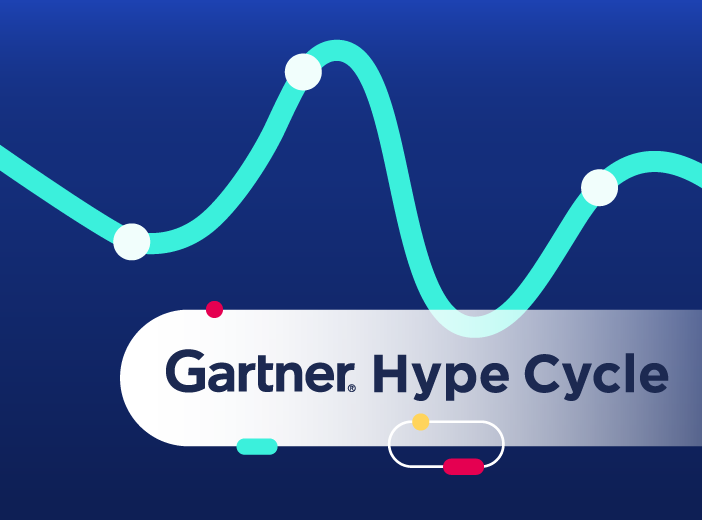Glossary
Data monetization
Data monetization is the process of using company data to drive quantifiable internal or external economic benefits.
What is data monetization?
Data monetization is the process of using company data to drive quantifiable internal or external economic benefits, including improving processes and creating new revenue streams by selling data to third parties. Data can be monetized or supplied in its raw form, or as part of products and services, such as dashboards.
What are the types of data monetization?
Data monetization can be internal or external:
- Direct internal – applied to deliver immediate financial benefits, such as by optimizing operations and streamlining processes
- Indirect internal – using data to inform better decision-making
- Direct external – selling data as an ongoing service or as a one-off transaction to outside organizations
- Indirect external – building products based on data, such as Insights-as-a-Service (IaaS) or Platform-as-a-Service (PaaS), and selling these externally
- Data bartering – trading data with partners without money changing hands, benefiting all parties involved
Why are the benefits of data monetization?
Organizations are now producing enormous volumes of data, and are increasingly realizing that this data is a valuable, intangible asset that is often untapped. Monetizing it is therefore vital to competitiveness, performance, and boosting revenues. It delivers six key benefits:
- Creates new revenue streams
- Differentiates organizations in the market, attracting and retaining customers
- Optimizes operational performance and decision-making
- Enables greater innovation, especially around new products and services
- Delivers greater ROI on data investments
- Builds strategic partnerships and drives collaboration
What are the challenges to creating a successful data monetization strategy?
While every organization has data that can be monetized, there are five key challenges to successfully delivering data monetization:
- Ensuring data privacy is protected and regulatory compliance needs and ethical standarsd are met
- Delivering high-quality data that is reliable, accurate and trusted by users
- Ensuring data is easily available to users at scale, and meets their specific needs
- For external data, that contracts and payments around usage are clear and enforceable, with efficient methods of delivery and billing
- Focusing on the right data, without selling data that undermines competitive advantage or critical intellectual property
What are the success factors for data monetization?
Overcoming the challenges to data monetization requires a focus on these factors:
- Robust data governance – data needs to be reliable, compliant, and high quality, requiring strong and well-enforced data governance processes across the organization
- Complete data inventory – organizations need to understand their complete data landscape in order to decide which assets could be monetized
- Strong technology stack – data needs to be available to users 24/7, meaning technology stacks have to be able to scale to handle increasing demand
- Customer trust in data – consumers have to trust that the data provided is reliable, compliant, and meets their specific needs
- Prioritizing the right data – organizations produce enormous volumes of data, meaning that it is vital to focus on preparing and offering the data assets that users actually require and will pay for and consume
- Making data discoverable and available – data has to be made available in the right formats for potential users to easily consume
- Cross-organizational collaboration – data is likely to come from across the organization, meaning that it requires cross-departmental collaboration to make it available more widely
How does a data marketplace support data monetization?
Successful data monetization requires data to be packaged into user-friendly, consumable formats that can be easily discovered and purchased by internal and external users. Data products meet the first need by providing data in an accessible, understandable and constantly-updated format. Data marketplaces promote data monetization by centralizing all data, ensuring governance rules are applied, and making it easy to discover, purchase and consume through an intuitive, self-service interface. Together they scale data monetization and ensure it is effective, efficient and meets long-term user needs.
Learn more

Blog
Transforming public data into value – lessons from Australia
Cities and municipalities create huge volumes of data - but ensuring it is used effectively by every department to engage stakeholders and build trust can be difficult. Using real-world examples from a new ebook published by our partner Peclet, we explain how municipalities can truly turn data into value.

Blog
5 reasons to enrich your data catalog with a data product marketplace
Creating a data catalog is the first step in your data strategy, enabling you to identify, structure, and take stock of your data assets. This process can be long, technical, and because of the growth of data, potentially ambitious in scope. However, once data is cataloged the question remains: how do you ensure that it is actually consumed at scale?

Blog
Gartner Hype Cycle: How data marketplace technologies are transforming data management
Where should CDOs and data leaders focus their strategies and investments when it comes to technology? To help, we highlight key trends from the new Gartner Hype Cycle for Data Management, focusing on the benefits of data marketplaces and data products.